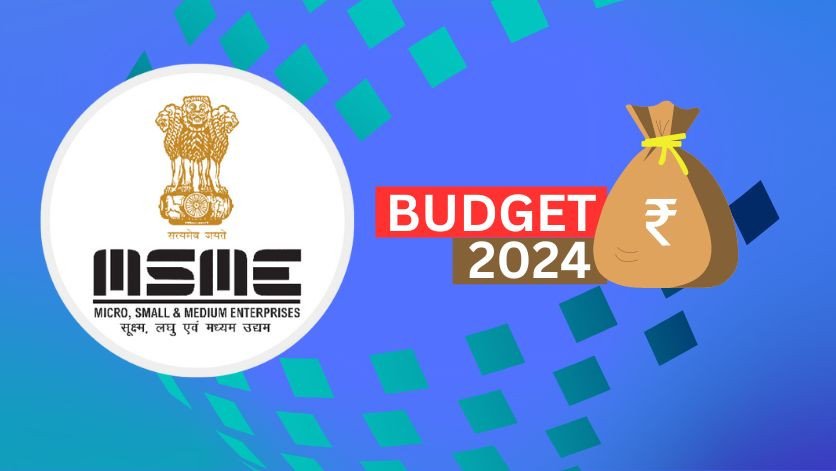Hey, like this? Why not share it with a buddy?

Synopsis
- A new Credit Guarantee Scheme proposed for manufacturing MSMEs to secure term loans for the purchase of equipment and machinery without collateral or third-party guarantee.
- The budget also proposed to increase the Mudra loan limit to ₹20 lakh under the ‘Tarun’ category for borrowers who have borrowed and repaid earlier ‘Tarun’ category loans.
- The Budget has also lowered the turnover threshold for buyers from ₹500 crore to ₹250 crore for onboarding the Trade Receivables Discounting System (TReDS) platform. This will add 22 CPSEs and 7,000 more companies to the platform.
The Union Budget 2024 has brought a wave of good news for Micro, Small, and Medium Enterprises (MSMEs) in India. Recognising the important role these businesses play in the country’s economic growth, the government has proposed a series of measures aimed at helping MSMEs thrive and compete on both national and global stages.
Easier Access to Loans
New Credit Guarantee Scheme
A new credit guarantee scheme has been proposed to facilitate access to term loans for manufacturing MSMEs during periods of financial stress. This scheme aims to make it easier for these businesses to obtain loans to purchase machinery and equipment. The scheme operates on a self-financing model, meaning no government subsidy will be provided. MSMEs must pay upfront and annual guarantee fees based on the term loan amount. In default cases, the government will also provide a backstop guarantee when defaults surpass a certain level. To support this initiative, a dedicated guarantee fund will be established with a guarantee coverage limit of ₹100 crore per applicant.
This approach could significantly reduce the financial barriers many MSMEs face when expanding or upgrading their operations, potentially leading to increased investment and growth in the sector.
Improved Credit Assessment
The budget also addresses how banks evaluate MSME loan applications, introducing a more modern and inclusive approach. Public sector banks will now develop methods for assessing whether an MSME is creditworthy rather than relying on external evaluations. These new models will use digital footprint scoring, which allows banks to consider MSMEs that lack formal accounting systems. This change in assessment methodology could make it easier for a wider range of MSMEs to access credit, particularly those that may have struggled with traditional assessment methods.
Support During Tough Times
Help for Stressed MSMEs
The budget introduced a new framework to support MSMEs during the stress period. By providing government-backed guarantees, the initiative aims to ensure uninterrupted credit flow to businesses experiencing temporary setbacks, such as those classified as special mention accounts (SMAs). This measure is intended to prevent MSMEs from transitioning into non-performing assets (NPAs) and bolster their resilience. A government-backed guarantee mechanism will be established to facilitate increased credit access for MSMEs.
Mudra Loan Limit Increased
The maximum Mudra loan limit under the ‘Tarun’ category will be increased from ₹10 lakh to ₹20 lakh for borrowers who successfully repaid previous loans under the ‘Tarun’ category.
This increase could provide more substantial financial support to growing businesses, enabling them to take on larger projects or investments. By rewarding responsible borrowers with access to bigger loans, this initiative aims to encourage financial discipline while supporting the growth ambitions of successful MSMEs.
Better Cash Flow Management
Expansion of the TReDS Platform
To enhance MSMEs’ access to working capital, the government proposes lowering the turnover threshold for mandatory buyer onboarding on Trade Receivables Discounting System (TReDS) platforms from ₹500 crore to ₹250 crore. This change will increase platform participation by 22 additional CPSEs and 7,000 more companies while also extending supplier eligibility to medium-sized enterprises. These changes will help more MSMEs manage their working capital effectively, reducing cash flow pressures.
Expanded SIDBI Services
New Branches in MSME Clusters
The Small Industries Development Bank of India (SIDBI) will expand its presence nationwide, enhancing its ability to support MSMEs. The proposed expansion plans include opening 24 new branches this year to cover 168 out of 242 major MSME clusters within three years. These new branches will provide direct credit services to MSMEs, making it easier for small businesses in various regions to access specialised financial services and support. This expanded presence could play a crucial role in addressing the unique needs of MSMEs in different parts of the country, potentially leading to more balanced regional development in the MSME sector.
Support for Food-Related MSMEs
Food Irradiation Units
The government will provide financial support to establish 50 multi-product food irradiation units within the MSME sector. Additionally, efforts will be made to facilitate the setup of 100 food quality and safety testing labs with NABL accreditation. Access to quality testing facilities can help food-related MSMEs meet regulatory standards and improve product quality.
Boost for International Sales
E-commerce export Hubs will be established through public-private partnerships to facilitate international market access for MSMEs and traditional artisans. These hubs will offer a streamlined ecosystem encompassing trade and export-related services under a unified regulatory and logistical framework. This initiative can significantly boost the export potential of small businesses and artisans, opening up new revenue streams.
The Union Budget 2024 proposed a range of benefits for MSMEs, from easier loans to support for global expansion. These proposed measures aim to help small businesses grow, innovate, and compete in local and international markets.
Disclaimer: The information provided in this article is generic in nature and for informational purposes only. It is not a substitute for specific advice in your own circumstances.
Related Posts
RECENT POST
- How to Maximize No Deposit Bonuses on Slots: A Complete Guide to SVV388 and Top Platforms
- INDIA SME FINANCE & INVESTMENT SUMMIT
- SEBI plans portal to boost market access for SMEs, says banks alone can’t fund economy
- SME BUSINESS FORUM
- Empower MSMEs & manufacturers to accomplish the vision of Hon’ble Prime Minister to make ‘Viksit Bharat’ said by Shri Haribhau Bagde, Hon’ble Governor of Rajasthan at the “Rajasthan Industries and SME Summit” held at Jaipur





